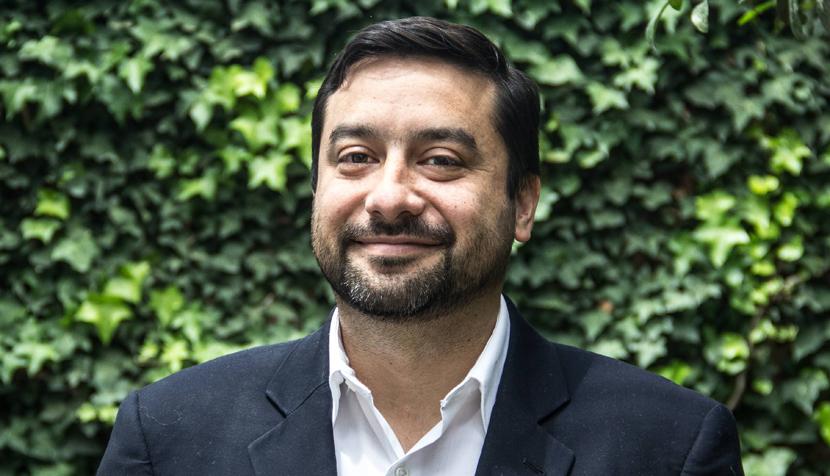Professor Sánchez Talks International Human Rights Law with the Law Weekly
Sam Pickett ‘21
News Editor
What Camilo Sánchez doesn’t know, and what he will uncomfortably know as soon as this is published, is that my goal since coming to law school has been to make him my best friend. As an aspiring international human rights lawyer, I greatly admire Professor Sánchez’s impressive credentials and commitment to the development of human rights in the Americas and, more specifically, in his home country of Colombia. Since his arrival in the fall, however, I have been even more impressed by his accessibility and commitment to the community. He often speaks at human rights law events and attends them even more frequently; he sponsors ’s new Spanish-language club[1]; he also fully committed to the role of inflatable-guitar holding rock star in this year’s 111th Libel Show. As a result, I was more than happy to sit down with Professor Sánchez and four other Law Weekly students to (1) show them how cool he is and (2) to learn more about how cool he is.
Professor Camilo Sánchez graciously met for lunch with Law Weekly staff, including his biggest fan Sam Pickett ’21. Photo credit UVA Law.
Professor Sánchez’s career has been motivated by a passion for learning and a restlessness that led him from Colombia to the United States and back. His plan for the first twenty years of his career was to explore the world and try as many jobs as he could to find what he loved to do, and then to spend the next twenty years focusing on that. While Sánchez’s career hasn’t been quite this frenetic, he has rejected complacency and embraced new experiences and new people. He began his career in human rights as part of the Colombian Commission of Jurists working with the families of those who had been disappeared during the Colombian conflict between the government and the FARC. [2] Soon after graduation, however, he received a scholarship to work at the Inter-American Commission of Human Rights in Washington, D.C. While the scholarship lasted for only a year, Sánchez continued to work there afterwards until he left briefly to get his LL.M. in International Legal Studies from Harvard.
Even though he returned to the Commission afterwards, he grew restless and sought a change. This time, he moved back to Colombia to work at the Center for the Study of Law, Justice, and Society (Dejusticia), where he spent time grappling with the complex issue of transitional justice and negotiating a political solution to the Colombian armed conflict. In fact, Dejusticia contributed to the peace negotiations by acting as an intermediary between the two sides and dealing with controversial problems—like balancing the ideals of international law with the practical necessities of ending a civil conflict, such as providing amnesty for rebel soldiers. And yet somehow, throughout all of this, Professor Sánchez had time to get his Ph.D. and write his dissertation on property law in societies in conflict and post-conflict.
As Colombia began to maneuver through the difficulties of a post-conflict society, Professor Sánchez decided that it was time for him to continue on a new journey, one that would allow him to continue growing as a person and an academic. And thus he arrived at UVA. Here, he has come to appreciate the additional time and student interaction that has come with teaching. He values the opportunity to better reflect on what he is teaching, which he has found to be a never-ending learning process that gives him the opportunity to interact with new people and new subject areas all the time. His reflective approach is evident in how he structures his International Human Rights Law clinic. Students do not just work with international human rights law—they investigate how the law intersects with diverse subject matters and they work to inject the knowledge, sensibilities, and principles of human rights into a wide range of the world’s industries. The clinic members also work to significantly impact human rights by promoting the development of international norms, and this week they will be traveling to Geneva for a convention of the UN Committee on Migrant Workers.
If you want to take a class with the man Amanda Yale (called “the nicest person I’ve ever met”) and who everyone agreed was a fantastic choice for lunch, then I would encourage you to take a class with Professor Sánchez. Or to go see a talk by him. Or to go to any human rights event and talk with him. Or you can be like me and just walk into his office and ask him to help you start your career in international human rights.[3] He certainly has the experience to do so.
___
shp8dz@virginia.edu
[1] E-mail Jen Kelso at jlk8uc@virginia.edu to learn more!
[2] The conflict lasted over half a century and has resulted in the disappearance of more than 100,000 people. This is more than the combined number of disappeared persons in Chile, Brazil, Argentina, and Paraguay.
[3] And he has! This summer I’ll be working at the Inter-American Commission on Human Rights in large part because of his help!

